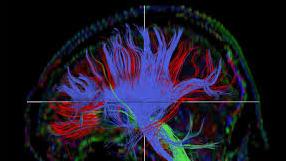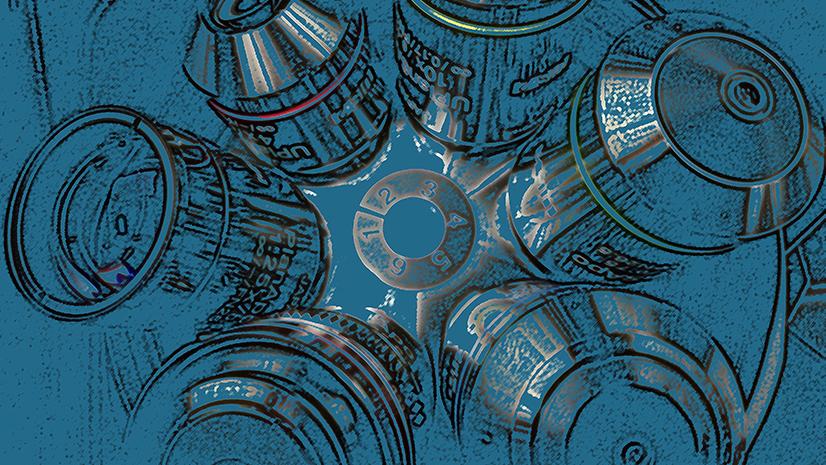
Imaging facility CyTUM-MIH
FV3000 Confocal Fluoview
Evident (former Olmpus) Laser scanning Microscope
Lasers: 375 nm, 405 nm, 445nm, 488nm, 514nm, 561nm, 640nm.
Objectives: 1,25x: air, 4x; air, 10x; air, 20x; air, 60x; immersion oil, 100x; silicon oil
- High Sensitivity Multi-Channel Imaging
- Macro to Micro Imaging and Super Resolution
- Increase Productivity with High-Speed Imaging
- Accurate Time-Lapse Imaging
- Superior Objectives
Image
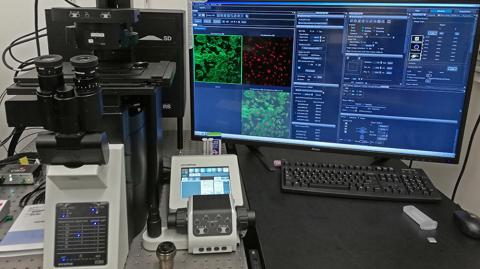
Mica Microhub
Leica™ Widefield Microhub
- 4 Objectives 1.6x, 10x, 20x, 63x
- 4 LEDs 365 nm, 470 nm, 555 nm, 625 nm
- High resolution Imaging CMOS camera
- Live cell imaging
- Long-term Time Lapse acquisition
- CO2 incubator
- Built-in dark room
- Sample finder
- OneTouch-Auto-Illumination
- AI based analysis
- Integrated Modulation Contrast (IMC)
- Reusable AI models and project parameters
Image
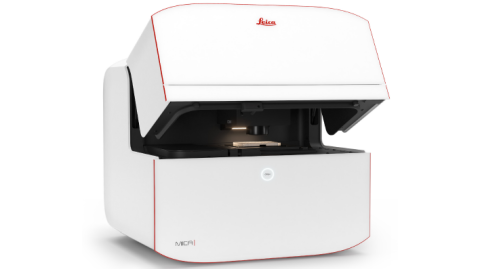
Zellscanner ONE
Zellkraftwerk™ multiplexed imaging Technology
- Highly Multiplexed Tissue Imaging (HMTI) based on cyclic immunofluorescence
- More than 30 markers per cell for cryopreserved and FFPE tissues and more than 100 markers per cell for single cell suspensions
- Antibody stainings can further be combined with mRNA in-situ hybridization (FISH)
- High dynamic range (HDR) imaging technology and true background subtraction for superior image quality
- Microscope performs all steps from sample readjustment, focusing, and image acquisition automatically.
- Pipeline for automated signal quantification developed by us can be used for data analysis
Image
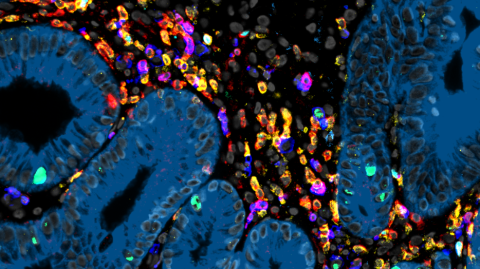
Copyright
Sebastian Jarosch
ScanScope Aperio AT2
Leica™ Slide Scanner
Fast, flexible and reliable, it is easy-to-use and consistently delivers high resolution, high quality images.
- Load and capture images of an entire carousel in less than 8 hours
- Sustained high throughput rate of 50 slides/hr with a 20x Objective
- Autoloader with 400-slide capacity
- Smaller file size and faster scanning with skip blank stripes technology
- Horizontal position minimizes risk of coverslips falling off
- Better first time success rates with fewer rescans
- Quiet, with minimal movement of slides in loader
Image
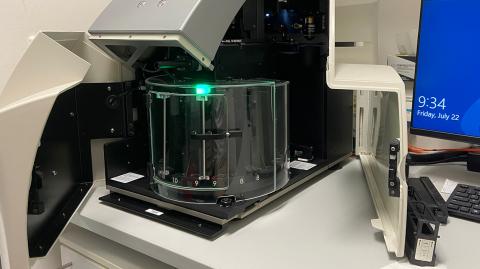
EVOS Cell Imaging System
Invitrogen™
EVOS FL Auto 2
- Speed: scan a 96-well plate in 3 fluorescent channels in less than 5 minutes
- Time-lapse live-cell imaging: option for precise control of temperature, humidity, and gases for normoxic or hypoxic conditions allows a wide range of biological studies under physiological conditions with an onstage incubator
- Area view: move rapidly and seamlessly between low-magnification, single-field mode and high-magnification scan mode to easily define and capture the area of interest
- Automation: time-saving features such as autofocus, rapid stage movement, and automated routines help reduce time to complete experiments, allowing high throughput, high data quality, and improved experimental reproducibility
- Data analysis: advanced software package for quantitative and statistical analysis
Image
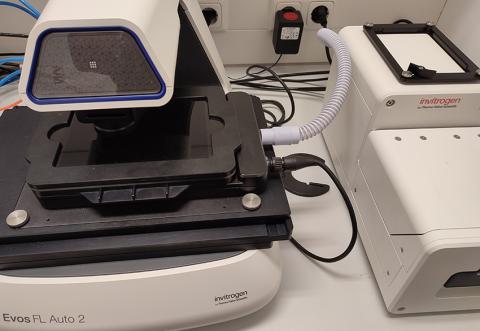
IVIS Spectrum
Perkin Elmer™ In Vivo Imaging System
- High-sensitivity in vivo imaging of fluorescence and bioluminescence
- High throughput with 23 cm field of view
- High resolution (to 20 microns) with 3.9 cm field of view
- Twenty eight high efficiency filters spanning 430 – 850 nm
- Supports spectral unmixing applications
- Ideal for distinguishing multiple bioluminescent and fluorescent reporters
- Optical switch in the fluorescence illumination path allows reflection-mode or transmission-mode illumination
- 3D diffuse tomographic reconstruction for both fluorescence and bioluminescence
- Ability import and automatically co-register CT or MRI images yielding a functional and anatomical context for your scientific data.
- NIST traceable absolute calibrations
Image
